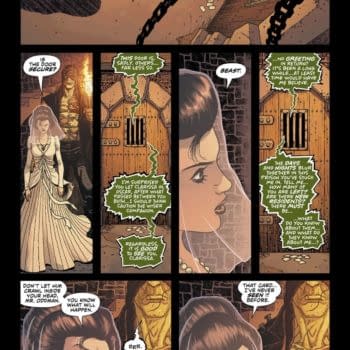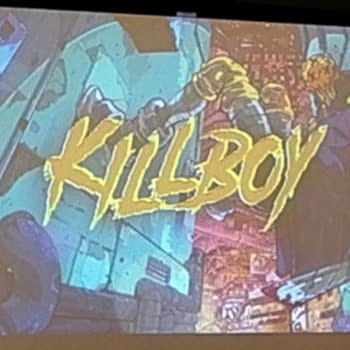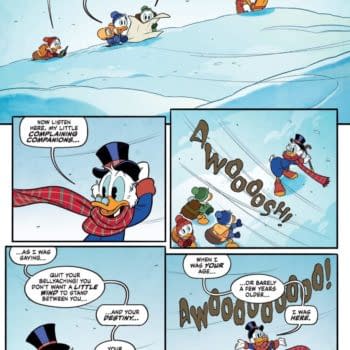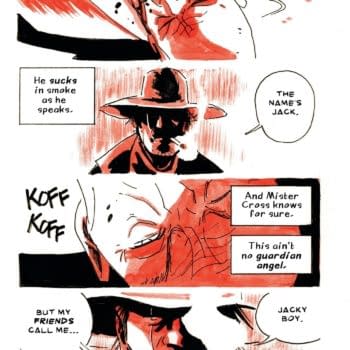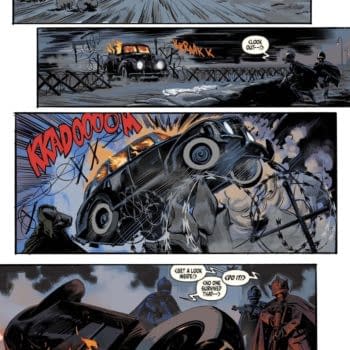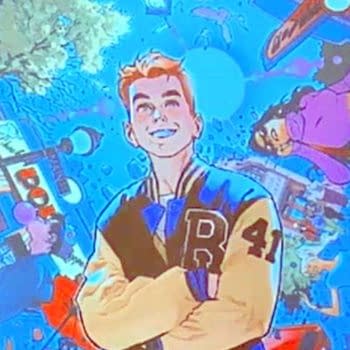Posted in: Comics | Tagged: collaboration, Comics, creator-owned comcis, Dan Goldman, dc comics, dean haspiel, entertainment, fred van lente, justin gray, Marvel Comics, New York Comic Fest 2014, writing comics
When Bleeding Cool Hosted Dean Haspiel, Fred Van Lente, Justin Gray, And Dan Goldman On Writing Comics At The New York Comic Fest + Audio
I hosted the "Writing in Comics" panel at the New York Comic Fest in White Plains, New York on Saturday on behalf of Bleeding Cool, featuring guests Dean Haspiel, (The Fox, The Fantastic Four, Billy Dogma) Fred Van Lente (Incredible Hercules, Brain Boy, Archer & Armstrong, Cowboys & Aliens), Justin Gray (Jonah Hex, Hawkman, The Monolith, Punisher), and Dan Goldman (Red Light Properties, Shooting War). And the results were fairly uproarious. Who would have thought that getting a bunch of comic writers together at one table and asking them to trade stories could possibly get out of hand? It made for a very entertaining afternoon for the audience, and like any good panel, we simply ran out of time to discuss all the topics that conversation prompted further…
Here are a few of the highlights from the panel discussion, followed by full audio, proving that this mayhem did, indeed, happen, for posterity:
Our initial topic was what the pros and cons are in working on company-owned characters and projects versus creator-owned work, and there was some consensus that creator-owned work had big perks. Goldman, who has worked purely on creator-owned projects until a few months ago but is now doing a piece for Valiant on Harbinger is coming to grips with an aversion to multiple re-writes and confirms that creator-owned work keeps the "electricity" going in a work. Conversely, he's enjoying having an editor for the first time on his second volume of Red Light Properties.
Gray chimed in to comment that good editors can really "inspire new directions" in your work and collaboration, as Gray has done extensively with Jimmy Palmiotti, is about dropping ego and really disassembling a project in detail. Haspiel's collaboration with Mark Waid takes the form of plotting and Waid adding the dialogue to "make my comics sing" but generally he feels that things are heading to "top down" construction in company-owned comics with decisions coming down from editorial to align comic stories with movies. Van Lente, Haspiel, and Goldman batted around the pros of having deadlines and it sometimes being a relief to have some guidance versus the benefits of feeling free from crippling deadlines on creator-owned projects.
Moving on to talking about the process of writing comics, Van Lente often starts with a "specific scene" or a "concept" or "quirk", which he works from until the "characters become interesting" whereas Goldman sees his whole cast of characters as "different pieces of the self" in conversation to create drama. Haspiel can see the "trends" developing in his own creator-owned work like Billy Dogma, themes that prompt stories that he works on over a long period of time, but when working on pitches to companies he tries to go for "bigger ideas", aware of what they are trying to sell.
When asked what works they recognize immediately as being "good writing" in comics, Haspiel cited the Vertigo series Scalped for its character-based narrative where you fall in love with both heroes and villains and also Grant Morrison and Frank Quitely's All Star Superman, which balances being "minimalist" as well as "entertainment". Van Lente looks towards the works of Steve Gerber, someone who can write in a "relevant" way as much as any newspaper, whereas Goldman's a big fan of manga and the Hernandez Brothers. Gray looks for "layers and textures" in good writing, building on the real world before introducing fantastic elements. In terms of film, WALL-E is one of his favorite examples, where dialogue is not even required.
Each of the panelists gave some insight into their earliest comics works as well. Van Lente made friends at college who turned out to be comic artists later, his first introduction to future professionals, whereas for Haspiel, one of his earliest works was The Verdict, not branching out into the creator-owned Billy Dogma until 1995. Goldman produced his first full comic in 1999 while working a data-entry job that spurred him to work at night and use photocopiers to produce his first comic to take with him to shop around at San Diego Comic Con.
When I asked the panelists to mention some current or forthcoming work they are proud of, Van Lente spoke about his book with Greg Pak coming from Random House this autumn, Make Comics Like the Pros. Gray has just spent 8 months adapting the fan-fiction supported prose phenomenon Wool into comics format for Amazon's Jet City Comics, turning 600 pages of prose into 120 pages of comics. Haspiel is currently drawing segments of Fantastic Four #6 and #7, but will also be producing a second series of The Fox for Red Circle/Archie Comics with Mark Waid. Both Haspiel and Van Lente also currently have plays being staged at the Comic Book Theater Festival in Brooklyn. Goldman is working this summer on a special comics project, Priya's Shakti, that handles the theme of rape in India through the lens of large mythological themes, a comic which will debut at the Mumbai Comic Con.
We were hard-pressed for time to take in questions at the end of the panel, though at least a dozen hands shot into the air, but we managed to address one before our time was up. An audience member asked what the "most frustrating thing" has been for these creators in working with major publishing companies. Van Lente said it's been not having the "final say" over work, admitting that as Neil Gaiman has said before, if someone thinks there's something wrong with your work, they are probably right, but the solutions they suggest are probably wrong. Goldman has found in the past, working mainly with book publishers rather than comics publishers that they often just "don't speak the language of comics" and don't solicit properly or make sure their books are stocked in comic shops.
This all, and much more besides, formed the basis of this comparing of experiences among comic writers at the New York Comic Fest, and it was definitely a group of panelists well-suited to hash out their observations together.
Fortunately, we have audio to capture the full energy of these comic writers addressing their craft:
Hannah Means-Shannon is EIC at Bleeding Cool and @hannahmenzies on Twitter















